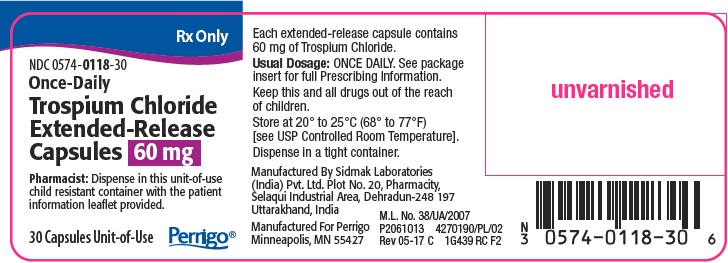
Trospium Chloride Er | Trospium Chloride Capsule, Extended Release while Breastfeeding
What is Trospium Chloride Er | Trospium Chloride Capsule, Extended Release used for?
Can I continue breastfeeding if I am using Trospium Chloride Er | Trospium Chloride Capsule, Extended Release? How long does it stays in breast milk?

8.3 Nursing Mothers Trospium chloride (2 mg/kg orally and 50 mcg/kg intravenously) was excreted, to a limited extent (< 1%), into the milk of lactating rats (primarily as parent compound). It is not known whether this drug is excreted into human milk. Because many drugs are excreted into human milk, Trospium Chloride Extended-Release Capsules should be used during lactation only if the potential benefit justifies the potential risk.
Trospium Chloride Er | Trospium Chloride Capsule, Extended Release Breastfeeding Analsys
Trospium chloride while Breastfeeding
Low RiskAdvice to take a minimal dose for a short time since anti-cholinergic drugs may decrease breast milk production. Check-up for anti-cholinergic symptoms (mouth dryness, constipation...)

What should I do if I am breastfeeding mother and I am already exposed to Trospium Chloride Er | Trospium Chloride Capsule, Extended Release?
Trospium Chloride Er | Trospium Chloride Capsule, Extended Release is in the category of low risk, if you have already used it then its not a big deal if health and behavior of baby is good. However your health care provider shall be aware of the fact that you have used Trospium Chloride Er | Trospium Chloride Capsule, Extended Release so you should inform him based on your convenience.
My doctor has prescribed me Trospium Chloride Er | Trospium Chloride Capsule, Extended Release, what should I do?
Trospium Chloride Er | Trospium Chloride Capsule, Extended Release comes in category of low risk and if your doctor is aware that you are breastfeeding it should be ok to use
If I am using Trospium Chloride Er | Trospium Chloride Capsule, Extended Release, will my baby need extra monitoring?
Not much monitoring required while using Trospium Chloride Er | Trospium Chloride Capsule, Extended Release
Who can I talk to if I have questions about usage of Trospium Chloride Er | Trospium Chloride Capsule, Extended Release in breastfeeding?
US
National Womens Health and Breastfeeding Helpline: 800-994-9662 (TDD 888-220-5446) 9 a.m. and 6 p.m. ET, Monday through Friday
UK
National Breastfeeding Helpline: 0300-100-0212 9.30am to 9.30pm, daily
Association of Breastfeeding Mothers: 0300-330-5453
La Leche League: 0345-120-2918
The Breastfeeding Network supporter line in Bengali and Sylheti: 0300-456-2421
National Childbirth Trust (NCT): 0300-330-0700
Australia
National Breastfeeding Helpline: 1800-686-268 24 hours a day, 7 days a week
Canada
Telehealth Ontario for breastfeeding: 1-866-797-0000 24 hours a day, 7 days a week
